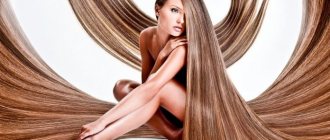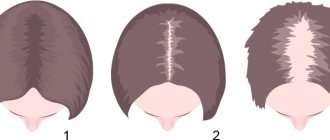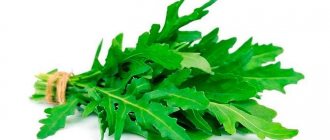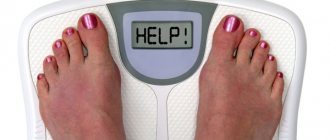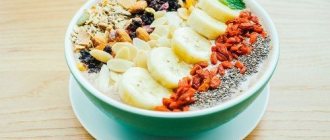10.10.2020 10:00
4515
Unbalanced and poor nutrition can harm your health. A lack of nutrients will immediately affect the condition of your hair. When we limit ourselves to certain foods, the body mobilizes its resources, while depriving areas of nutrition that are not vital. Our hair is among the first to suffer.
It’s surprising that when trying to achieve a slim figure, we completely forget about other components of beauty. When we set ourselves the goal of achieving an “ideal weight,” we are ready to adhere to even the most strict diets. However, an unbalanced and poor diet can harm your health. A lack of nutrients will immediately affect the condition of your hair. When we limit ourselves to certain foods, the body mobilizes its resources, while depriving areas of nutrition that are not vital. Our hair is among the first to suffer.
Sudden weight loss in itself is a great stress for the body. It is optimal to lose weight by 1 kg per week. Unless a woman is obese, rapid weight loss causes mineral imbalances and leads to protein deficiency. Therefore, it is very important to undergo examination and consult with a doctor before starting any diet. Otherwise, a poor diet will cause severe hair loss and ruin its appearance.
Why does hair fall out when losing weight through dieting?
How is hair structured? Each hair has a living (invisible) and relatively non-living (visible) part. The living part of the hair is the hair follicle, i.e. its root along with the surrounding tissues, glands, muscles, blood vessels and nerve endings. Here the cells of the outer part of the hair are synthesized. These cells multiply at tremendous speed, and for normal division they need high-quality nutrition. The lifespan of hair is from 3 to 7 years. When it falls out, a new hair grows from the same bulb. In order for the process of nucleation and creation of new hair to go smoothly, you also need a lot of nutrients.
Why are diets bad for curls? On a diet, the body does not receive a whole range of vitamins, microelements, and sometimes proteins, fats, and carbohydrates. The “emergency mode” is switched on - nutrients are supplied primarily to vital organs. Naturally, hair is not one of them.
Due to lack of nutrition, the cycle of hair growth and formation is disrupted: they “freeze” in the follicles, their structure is damaged, they become weak, thin, and dull. The longer the diet lasts, the more serious the defects in the follicle and the worse the condition of the hair.
Diets in the spring are especially dangerous, when the body is deprived of useful elements that are vital for it after winter.
When does hair start to fall out after dieting? As a rule, curls begin to thin out three months after the start of weight loss. By this time, 30% of hair follicles are already seriously damaged. Diffuse alopecia begins when hair falls out evenly throughout the head.
The remaining hairs lose their tone and shine, become thinner, break off, which makes the hairstyle untidy and disheveled. The condition of once long hair is especially deplorable - after all, the bulb does not have the strength to withstand its weight. The daily hair loss rate (approximately 100 hairs) increases by 20–30%.
In what cases can you completely lose your hair after a diet? You need to be especially careful with weight loss through diets if there are cases of early baldness or increased hair loss in your family, or if you have a history of autoimmune, endocrine, or dermatological diseases.
Important! Choosing your own diet is “Russian roulette” not only for your hair, but also for your overall health. Therefore, contact specialists - nutritionists, nutritionists. If the diet is prescribed by a professional, you will not have problems with your hair: the doctor will calculate the amount of nutrients your body needs based on your condition, habits, and lifestyle.
Poor diet and hair loss
Improper or limited nutrition can disrupt the life cycle of hair, which consists of 3 phases. Diet can trigger the transition of hair follicles from the growing phase to the resting phase. As a result, the daily rate of hair loss will increase by 20-30%.
For many people, hair loss associated with sudden weight loss can last from several months to six months. With the return to proper nutrition, the hair shaft is restored.
It is recommended to take iron-containing vitamins and not lose more than 1 kg per week. However, you should not rely only on the help of supplements, because the body needs proteins, fats, as well as a healthy intestine and good metabolism.
In order for weight loss to be effective and not lead to disastrous consequences, it is important to approach your diet wisely. Well-groomed, shiny hair is certainly more attractive than thinning hair. Spend enough time creating a balanced menu. Then you won't have to spend months or even years of your life restoring damaged hair.
What diets cause severe hair loss?
Hair literally comes out in clumps after severe weight loss on “fast-acting” diets. What to do - this is how our body reacts to severe stress, which is sudden weight loss. Reasons for this:
- Hormonal imbalance: subcutaneous adipose tissue is involved in the synthesis and distribution of progesterone and estrogen. If there is a sudden deficiency of adipose tissue, the body does not have time to adapt, and hormone levels can drop to critical levels.
- Metabolic disorders: due to extreme weight gain, the body turns on a protective mode. Now he will put any food, even low-calorie food, in reserve, cutting down on the expenditure of calories on the functioning of the immune and other vital systems.
- Malfunctions of the gastrointestinal tract: strict restrictions in food lead to the fact that gastric juice corrodes the mucous membranes of the stomach and duodenum, and due to a lack of dietary fiber, intestinal motility decreases.
- Negative effects on the cardiovascular system: the heart and blood vessels are accustomed to your body weight, and a sudden decrease in weight will put a lot of stress on them. The volume of blood decreased (after all, the volume of tissue supplied with blood decreased), and the vessels remained stretched. Result: arrhythmia, pressure surges.
- Loss of muscle tissue: sudden weight loss occurs mainly due to muscle mass, which can lead to muscle dystrophy.
Any disruption in the body’s functioning instantly affects the quality of hair, skin and nails. That is why experts advise losing no more than a kilogram per week. Even minus 5 kg during this period is already a serious sign of baldness.
However, sometimes the diet does not seem so strict, and causes no less damage to the hair.
- On the keto diet that is fashionable today, hair falls out very rapidly. The principle of nutrition involves eliminating carbohydrates, consuming large amounts of fat and moderate amounts of protein. A decrease in carbohydrates in the diet leads to weakened immunity, deterioration of brain nutrition, and excess fat causes changes in blood lipids and provokes kidney problems. All this is a serious blow to the quality of curls.
- Diets with limited meat cause the greatest damage to hair: they provoke a lack of iron and silicon in the body. Silicon deficiency makes hair brittle along its entire length, and with a lack of iron, the consequences can be of varying severity: from excision of the ends of the hair to complete baldness.
- If you go on a mono-diet, for example, kefir, you can provoke a deficiency of the most important elements for hair development and growth: copper, zinc, selenium. Hair will lose elasticity, begin to tear, fall out, and grow thin and slowly. The consequences of such diets can be long-term, since a severe lack of elements is very difficult to restore.
- If you remove fats from the diet, your curls will lose their lipid mantle and will be deprived of fat-soluble vitamins - A, E, D. The result is thinning hair, dull lifeless strands with deep damage. And since many women are afraid to regain (or gain) kilograms and eat too little fat, the body suffers more and more over time from a lack of microelements.
Important! When going on a strict diet, do not rely on vitamin complexes - this is not a panacea. Hair needs not only vitamins, but also a balanced combination of proteins, fats, carbohydrates, as well as a system that delivers all this to the follicle - i.e. a healthy gastrointestinal tract, heart and blood vessels, smooth metabolism , etc.
Causes of hair loss
Contrary to numerous stories about a lack of vitamins and harmful components in shampoos, there are only five real reasons for severe hair loss:
Genetic factor
One of the main causes of baldness worldwide is androgenetic alopecia (baldness). Most often, this disease is inherited from parents to children, and mostly men are susceptible to it. Women experience androgenetic alopecia less often.
As a result of the disease: - In women, hair in the parting area becomes thinner and falls out. - In men, hair thins and falls out in the fronto-parietal region and remains only on the sides and in the occipital region. With age, complete baldness occurs. The cause of androgenetic alopecia is the hormone testosterone, which interacts in the capillary hair follicle with the enzyme 5-alpha reductase, subsequently turning into dihydrotestosterone. Increased sensitivity (often genetically determined) of follicles to dihydrotestosterones provokes hair loss.
In this case, it is almost impossible to restore hair growth to the bald area. No miracle cures, masks or lotions will return either the hair itself or its quality before the onset of the disease. Therefore, it is very important to see a doctor before your hair begins to fall out—even when it is thinning.
Stress
It is important to understand here that stress means either a one-time, but very deep experience (for example, the death of a loved one, an accident, a difficult life situation), or chronic stress that greatly affects the general condition of the body. You may notice hair loss no earlier than a couple of months after suffering stress, when the nutrition of the hair follicles is disrupted. If you notice severe thinning of your hair, remember what you experienced two or three months ago. Fortunately, stress loss is reversible.
Deficient or unhealthy diet
Hunger, low-calorie diets, and poor diet can cause hair loss. A change in the nutritional system, and even more so hunger, is also stress for the body. Many organs stop receiving enough energy to function, the supply of vitamins and minerals is depleted, and the body is forced to extract resources for life from incoming food. There's no time for hair...
Hormonal imbalances and changes
Hair loss is rare in children, but teenagers, postpartum women and postmenopausal people experience it much more often.
— In teenage girls aged 15–18 years, the production of androgens (steroidal male sex hormones) increases, which can lead to temporary loss. — Adult women often experience hair loss after childbirth. Usually the reason lies in hormonal changes, and the loss stops within a year. — Men and women after 40–45 years of age may experience hair loss as a result of hormonal changes in the body. Hair becomes thinner, falls out and grows reluctantly due to a decrease in the level of androgenic hormones. We described this mechanism of loss in more detail above in point No. 1.
Exposure to drugs
Strong medications (such as some antidepressants, drugs to treat gout, arthritis, and heart disease) and chemotherapy often cause prolapse. But after discontinuation of the drug and complete restoration of the body, hair growth resumes. In any case, your doctor should warn you about such a side effect.
How to get your hair back and stay slim?
Do you really have to make a choice between a great hairstyle and a toned figure? No! You can reduce your weight to the desired numbers, and at the same time, after losing weight, your hair will not fall out terribly. The main thing is a reasonable approach based on scientific achievements, as well as a comprehensive effect on the body - inside and out.
Specialist help
Trichology is a relatively young science that helps maintain healthy hair and scalp. Dietetics and nutritionology are areas of medicine that deal with issues of competent individual nutrition. Consultation with a trichologist and nutritionist is the first step towards an ideal appearance.
Doctors will definitely conduct a comprehensive examination of the patient. For a trichologist this is:
- computer diagnostics of the scalp and hair (trichoscopy);
- blood test for thyroid-stimulating hormone (TSH);
- blood test for the level of male hormones;
- blood test for hemoglobin.
A nutritionist will assess your health status and identify existing diseases. Will be held:
- clinical tests;
- ultrasound examinations of internal organs;
- impedansometry (determination of muscle-fat composition of the body).
Proper examination is a guarantee of effective treatment. The trichologist will select cosmetics that are suitable specifically for your hair, and, if necessary, recommend pharmaceutical preparations and vitamins. A nutritionist-nutritionist will develop an individual health maintenance program, including treatment and rehabilitation measures, diet and nutrition. As soon as the reason that caused your curls and figure to suffer goes away - improper metabolism, poor nutrition and self-care - your hair will be restored and your weight will return to normal. Finding both the desired shape and luxurious hair is a long process. Many people start treatment, but, not seeing any brilliant results, get tired and quit. Do not forget that the extra pounds appeared over several years, and hair fell out for several months. Therefore, we must mentally prepare for the same long recovery process. Let you be inspired and motivated by the fact that this slow result will definitely stay with you for life!
Important! Curls “fix” everything related to our diet: they reflect both the nature of the diet and its duration. A spectral analysis of your hair will show how much your body is supplied with minerals and how exactly you exhausted yourself by abstaining from food - down to days.
Diet
Until experts have developed an individual nutrition system for you, you can use publicly available recommendations. The best weight loss program for hair is a healthy diet.
The diet should include all food groups:
- vegetable and animal fats (in small quantities, 1 tablespoon per day);
- fresh fruits and vegetables;
- meat (low-fat varieties);
- seafood;
- nuts and seeds;
- cereals;
- dairy
To gradually lose weight, you need to reduce your daily calorie intake (portion size) by about 20% of your usual amount. Such a diet adjustment will not harm your curls or interfere with their growth and restoration.
In your daily diet you need to maintain a balance of BZHU. B is proteins, the main building material of the body. Without it, the metabolism will not be healthy, and the immune system will malfunction. F are fats; they help the body absorb many vitamins and produce hormones. Y - carbohydrates, our main source of energy for all reactions and processes in the body. If the balance of these components is imbalanced in the menu, serious problems with hair thickness may arise. To prevent this from happening, use the rule of quarters: one quarter of your plate should be occupied by protein foods, the other by complex carbohydrates (porridge, wholemeal bread, dark wheat pasta, etc.), the third by vegetable salad seasoned with fats (butter, sour cream), and leave another part for a snack with fruit or dairy products.
Important! There are “bad” sources of BJU and “good” ones. Preference should be given to good ones - these are all natural products, as well as those that have undergone minimal heat treatment. Industrially produced products containing excess salt, harmful food additives, and trans fats are considered “bad.”
What should you give up to lose weight and improve your hair?
- From eating salt. Don't worry, you'll get enough sodium from the foods you eat. But excess water will stop accumulating in your body. A salt-free diet will reduce weight, eliminate swelling, improve kidney function and make hair lush, elastic and shiny.
- From the habit of eating sweets. Believe me, this is just a habit - try to stay without sweets for just a week, and you will notice how the craving for sweets and cookies has decreased. Lack of sweets in your diet will help you quickly get rid of extra pounds, and also reduce oily skin and hair.
- From fatty, spicy, fried, canned, smoked. Fast food, chips, nuts, sausages and other unhealthy goodies are the main cause of obesity and hair problems. A person who is accustomed to eating such food chronically lacks nutrients, which negatively affects his health in general and the condition of his hair in particular.
- From baking made from premium white flour. Along with extra pounds, bloating, belching, flatulence and constipation will disappear from your life forever. Replace regular wheat bread with flour products made from whole grain, rye flour with added bran, and you will get vitamins B, E, K, zinc, selenium, chromium, manganese, magnesium, and dietary fiber.
- From alcohol. In addition to the fact that it is a toxin that damages the cells of our body, and especially the sensitive cells of the hair follicle, alcohol is also extremely high in calories. Allow yourself only a glass of dry red wine several times a week - this way you will not harm yourself, but rather replenish your body with fructose, vitamins B1, B2, C, organic acids, iron, potassium, magnesium, zinc.
- From overeating. The best thing for healthy functioning of the body is a stable, balanced diet. Try to get up from the table with a slight feeling of hunger - your brain will receive a signal of satiety only 20 minutes after you finish your meal. However, if you did attend a feast and ate too much, do not torture yourself with fasting days. This will cause your body to experience stress, which will not benefit your metabolism or your hair. Just eat as usual and drink more water.
Important! To get your hair in order faster, you should take a suitable vitamin and mineral complex. However, it is better if it is prescribed by a doctor. Agree with your specialist on the duration and frequency of taking vitamins: the complex is usually prescribed 1 tablet per day for three months. We remind you: vitamin complexes are not a replacement for a complete diet, but a supplement to it.
Special hair care
If your curls have suffered from weight loss, then, in addition to normalizing your diet, you will need special care for them. Hair after a diet is weakened and often damaged, so your task is not to injure it even more, but, if possible, to strengthen and strengthen it.
- In the morning and evening, carefully comb your strands with a comb or massage brush. Start combing your hair from the ends to the roots, gradually unraveling the curls. The procedure will increase blood circulation in the scalp and help the fatty mantle to be evenly distributed along the entire length of the curls.
- Massage your scalp several times a week. Use special massagers, applicators, or your own hand for this. Using gentle massaging movements, move from the temples to the back of the head. Increasing blood circulation in the scalp is the key to good nutrition of hair follicles and intensive hair growth.
- If you are experiencing hair loss due to diet or for any other reason, do not perm, straighten, bleach or dye your hair. You should refrain from tight hairstyles and complex styling. Give your curls more freedom.
- The money saved during the diet (on cakes, ice cream, alcohol, etc.) should be spent on hair cosmetics. It must be of high quality, without aggressive elements, enriched with natural extracts and vitamins. The main rule is that shampoo should match your scalp type, balms and conditioners should match your hair length type.
Important! Read the label on cosmetics carefully: look for ingredients that will support the protective sheath of the hair, i.e. lipids and keratin. The former may be listed as oils, phospholipids, ceramides, linoleic or linolenic acids; the second are chitosan, proteins, dimethicone or cyclomethicone, keratin itself.
Tune in to the fact that self-care, moderation at the table and healthy eating are for life. Then your health will be in order from head to toe, and you will become the permanent owner of chic shapes, thick hair and a great mood!
What is diffuse alopecia after coronavirus?
Doctors note uniform hair loss over the entire area of the head in men and women who have recovered from Covid-19. In this case, bald spots do not appear, but the density noticeably decreases, and the structure of the hair shaft suffers. Some patients report that their hair is literally falling out, while others say that they have noticed more hair falling out than usual.
Upon detailed study, it turns out that in patients after Covid, the natural life cycle of the hair is disrupted. So, this type of alopecia (baldness) is called telogen effluvium. This means that the hair “freezes” in the resting phase and stops growing. They do not move on to the next phase of the cycle. Follicular activity is reduced or absent altogether.
This happens due to the negative effect of the SARS-CoV-2 virus on blood microcirculation. Thus, the infection affects the walls of blood vessels, blood circulation is disrupted in all organs and systems. The scalp suffers no less. Not enough nutrients are supplied, the follicles have nothing to “eat”, and they begin to wait for better times. After a few weeks of such hunger, the hair comes out.
The picture is also aggravated by other negative processes that occur during illness. A large number of toxins in the body, lack of nutrition due to lack of appetite and doctors’ restrictions, the need to take medications that negatively affect the hair, oxygen deficiency and many other factors cause hair problems.
At the moment, the connection between post-Covid alopecia and the patient’s gender and age has not been established. The problem can arise for anyone who has encountered a virus attack.
